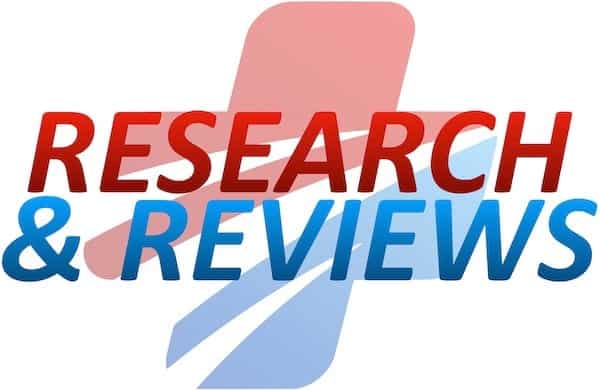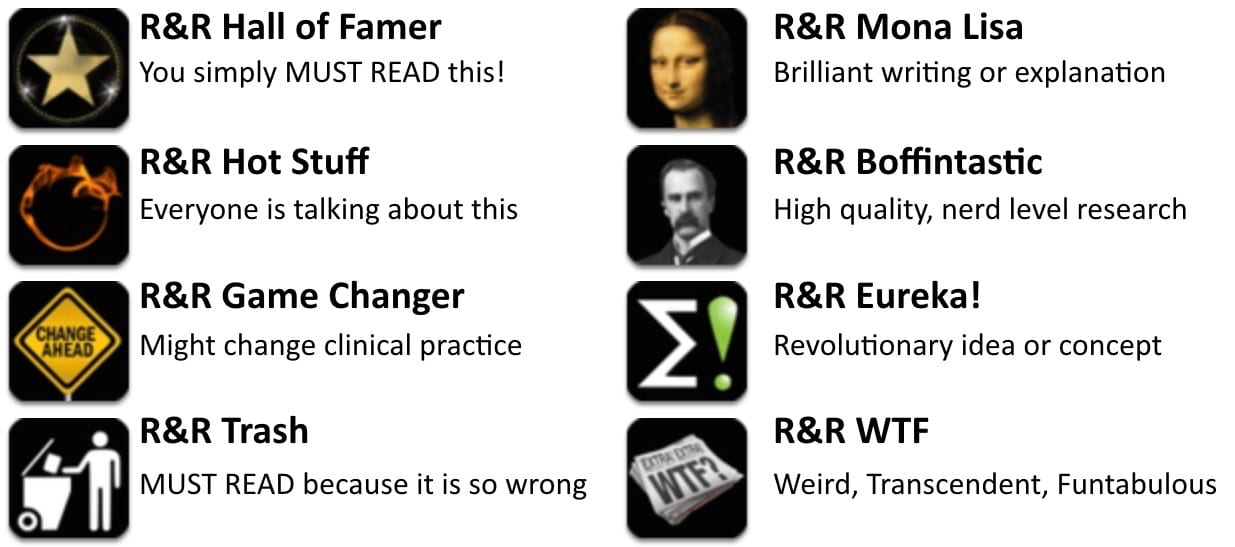R&R In The FASTLANE 166
Welcome to the 166th edition of Research and Reviews in the Fastlane. R&R in the Fastlane is a free resource that harnesses the power of social media to allow some of the best and brightest emergency medicine and critical care clinicians from all over the world tell us what they think is worth reading from the published literature.
This edition contains 5 recommended reads. The R&R Editorial Team includes Jeremy Fried, Nudrat Rashid, Soren Rudolph, Anand Swaminathan and, of course, Chris Nickson. Find more R&R in the Fastlane reviews in the : Overview; Archives and Contributors
This Edition’s R&R Hall of Famer
Hodgson CL, Bailey M, Bellomo R, Berney S, Buhr H, Denehy L, et al. A Binational Multicenter Pilot Feasibility Randomized Controlled Trial of Early Goal-Directed Mobilization in the ICU. Crit Care Med. 2016;44(6):1145-52. PMID: 26968024
- This clever pilot study was a randomised control trial which involved fifty critically ill adults mechanically ventilated for greater than 24 hours in 5 ICU’s in Australia and New Zealand. No difference was observed in the length of inpatient stay between groups (assigned to either early goal directed mobilisation or to standard care (control)) and certainly this study had not been powered to show this anyway. The most important findings were that early mobilisation is safe and feasible. Additionally, the patients in the intervention arm showed increased duration and level of active exercises. What are you waiting for? Get your patients moving.
- Recommended by: Nudrat Rashid
Bentzer P et al. Will This Hemodynamically Unstable Patient Respond to a Bolus of Intravenous Fluids? JAMA 2016; 316(12):1298-309. PMID: 27673307
- The JAMA rational clinical examination turns a critical eye to the question of fluid responsiveness. No big surprise in their findings: passive leg raise followed by cardiac output measurement appears to be the best we have for now. This short 12-page article brings together a large amount of data into one place, creates likelihood ratios for different assessments and is a must add summary to any evidence library.
- Recommended by: Anand Swaminathan
Simpkin AL, Schwartzstein RM. Tolerating Uncertainty – The Next Medical Revolution? The New England journal of medicine. 375(18):1713-1715. 2016. PMID: 27806221
- This is a brilliant essay. I sort of just want to copy and paste it here. The authors point out that although we are all rationally aware of the uncertainty in medicine, the medical culture is deeply against acknowledging or embracing it. Our quixotic quest for the right answer conceals the fact that ideal clinical reasoning is iterative and evolutionary. They point out that two of the major problems that we face in modern medicine – the seemingly contradictory over-testing and premature closure – are two sides of the same coin. They both arise out of our discomfort with and inability to discuss uncertainty. A quote: “Key elements for survival in the medical profession would seem, intuitively, to be a tolerance for uncertainty and a curiosity about the unknown.”
- Recommended by: Justin Morgenstern
deRoux SJ et al. “Bath salts” the New York City medical examiner experience: A 3-year retrospective review. J Forensic Sci. 2016. PMID: 27921290
- The medical examiner office in NYC takes a look at deaths in which bath salts, or synthetic cathinones, were detected. Of 30 deaths reported, half were attributable to effects from synthetic cathinones. Interestingly, of the 15 not attributable to physiologic effects of cathinones, violent deaths predominated. No practice changes here, but this paper offers a nice review of previously reported deaths associated with cathinones and a reminder of potential lethality of these “legal highs.”
- Recommended by: Meghan Spyres
Driver BE, Olives TD, Bischof JE, Salmen MR, Miner JR. Discharge Glucose Is Not Associated With Short-Term Adverse Outcomes in Emergency Department Patients With Moderate to Severe Hyperglycemia. Ann Emerg Med. 2016;68(6):697-705 e3. PMID: 27353284
- A more appropriate approach to simple hyperglycemia may be ensuring appropriate outpatient follow up for long-term glycemic control, just as we currently do for asymptomatic hypertension, instead of reaching a “safe” glucose threshold before discharge.
- Recommended by: Salim R Rezaie
Intensivist and Donation Medical Specialist, Australia | @NudratRashid |







